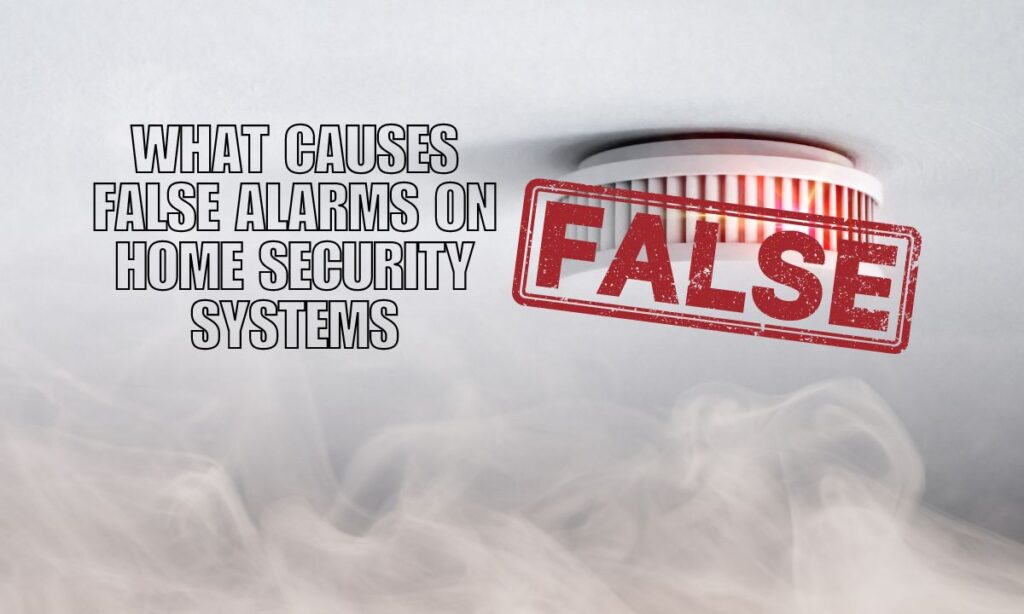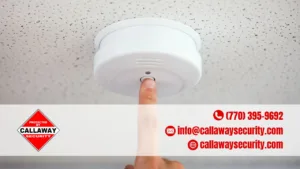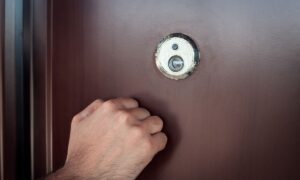False alarms on home security systems happen when an alarm is triggered without an actual security threat. These incidents can be caused by user mistakes, equipment malfunctions, or environmental factors. While home security systems are designed to protect us, false alarms can lead to unnecessary panic, costly fines, and even a delayed response to real emergencies.
False alarms typically occur due to human error, faulty equipment, power issues, or environmental interference. Addressing these causes can help homeowners prevent unnecessary disruptions and maintain a reliable security system.
Key Takeaways:
- Human error accounts for most false alarms—often due to incorrect system usage or forgotten disarmament.
- Equipment issues such as faulty sensors or outdated hardware can cause unintended triggers.
- Power and battery failures disrupt the system’s reliability, leading to false alarms.
- Environmental factors like pets, temperature changes, and strong winds can interfere with motion detectors.
- Improper sensor placement in high-traffic areas or near vents may lead to false triggers.
- Lack of maintenance can cause dust buildup or outdated software to impact system functionality.

Common Causes of False Alarms
1. Human Error: The Leading Cause
Human error is responsible for roughly 85% of false alarms. This includes:
- Incorrect system operation – Untrained users, such as guests, children, or house sitters, may unintentionally set off alarms.
- Forgetting to disarm the system – Opening doors or windows without turning off the alarm can trigger a false alert.
- Entering the wrong security code – Multiple incorrect attempts can result in an alarm activation.
- Improper exit/entry timing – Rushing out before the system arms properly can lead to accidental triggers.
2. Faulty or Poorly Installed Equipment
Home security equipment must be properly installed and maintained to function correctly. Common equipment-related issues include:
- Poorly aligned sensors – Misaligned motion or door/window sensors can detect non-existent movement.
- Malfunctioning devices – Aging security components may trigger false alerts due to hardware failures.
- Loose doors and windows – If entry points aren’t secured properly, sensors may be falsely activated by vibrations or drafts.
3. Power and Battery Problems
A security system relies on consistent power to function efficiently. When power issues arise, false alarms may follow:
- Low batteries – Motion detectors, door/window sensors, and control panels with weak batteries can malfunction.
- Power fluctuations – Electrical surges or outages can cause alarm systems to react unexpectedly.
- Wiring issues – Faulty wiring may send inaccurate signals to the control panel.
4. Environmental Interference
The environment plays a bigger role in false alarms than many homeowners realize. Several natural factors can affect security sensors:
- Pets – Animals moving around the house can set off motion detectors if they aren’t adjusted for pet immunity.
- Insects and small animals – Bugs crawling on motion sensors can falsely trigger alarms.
- Temperature changes – Air conditioning, heating vents, or sunlight can create heat variations that some sensors mistake for movement.
- Storms and wind – Strong winds can rattle loose windows or doors, activating alarms.
5. Improper Sensor Placement
Incorrect placement of security sensors can result in unnecessary false alarms. Some common mistakes include:
- Motion detectors near air vents – HVAC systems blowing air may cause movement detections.
- Smoke detectors near heat sources – Installing smoke alarms too close to stoves or bathrooms can cause false triggers from cooking fumes or steam.
- Sensors facing reflective surfaces – Mirrors or glass windows can create false motion readings.
6. Lack of Regular Maintenance
Without routine upkeep, a home security system may become unreliable. Maintenance issues leading to false alarms include:
- Dust and debris accumulation – Dirty smoke detectors or motion sensors may register false readings.
- Outdated software – Systems with old firmware may not process signals accurately.
- Worn-out components – Aging batteries and loose wiring can cause inconsistent system behavior.
Additional Information About False Alarms
- Some municipalities charge fines for excessive false alarms to discourage misuse and unnecessary emergency responses.
- False alarms can lead to alarm fatigue, where homeowners or monitoring centers become desensitized to alerts, potentially delaying responses to real threats.
- Many modern security systems offer false alarm reduction features such as pet-friendly motion detectors and dual-confirmation alerts.
How to Prevent False Alarms
Train All Users
- Teach family members, guests, and house sitters how to arm and disarm the system properly.
- Keep a visible guide near the control panel for quick reference.
Perform Regular System Checks
- Replace weak batteries in sensors and control panels.
- Ensure all doors and windows are securely closed before arming the system.
- Clean motion sensors and smoke detectors to remove dust buildup.
Optimize Sensor Placement
- Adjust motion detectors to account for pets.
- Keep smoke detectors away from kitchens and bathrooms.
- Ensure door and window sensors are firmly in place and aligned.
Upgrade to Smart Features
- Use geo-fencing to arm/disarm systems automatically when leaving or arriving home.
- Enable two-step alarm verification to reduce unnecessary emergency dispatches.
- Invest in high-quality sensors that differentiate between real threats and environmental triggers.
Frequently Asked Questions (FAQs)
Why does my home security system keep going off for no reason?
Most likely, the issue stems from user error, sensor misalignment, or environmental interference. Check for loose doors/windows, incorrect settings, or dying batteries.
How can I stop my pet from triggering false alarms?
Consider using pet-friendly motion detectors that ignore movement from animals under a certain weight threshold. You can also adjust sensor angles to avoid pet pathways.
Will a power outage trigger my alarm system?
If your system has a backup battery, it should remain functional. However, low backup battery levels can lead to false alarms when power fluctuates.
How often should I test my security system?
It’s recommended to test your system monthly to ensure sensors, alarms, and communication lines are functioning properly.
Final Thoughts: Keeping False Alarms in Check
False alarms can be frustrating, but they are preventable with the right knowledge and maintenance. By properly training all users, keeping equipment updated, and adjusting sensors for environmental factors, homeowners can significantly reduce the risk of false alerts. A reliable home security system is one that works efficiently—without unnecessary disruptions.
If you’re experiencing false alarms or want to learn more about how to prevent them, don’t hesitate to contact Callaway Security™. Our Atlanta security company can help you assess your home security system, identify potential risks, and recommend solutions to reduce false alarms. Contact us today to schedule a consultation and take the first step towards a more reliable and effective security system.












